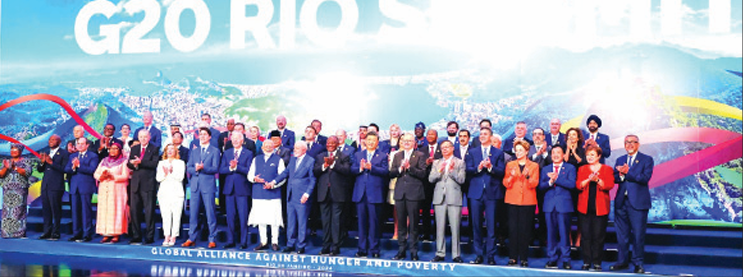As the Brazilian Presidency of the G20 winds to a close, its efforts to successfully build consensus on key matters about global governance and the future of humanity have been widely appreciated. Efficiently steering the G20 preparatory processes and various working groups’ activities, Brazil made substantial headway in building traction towards a pact against hunger and poverty. Its stewardship of the G20 has also resulted in the institution of mechanisms including the establishment of the G20 Women’s Empowerment Working Group and Coalition for the Local and Regional Production of Vaccines and Medicines. However, one of the most significant and perhaps the most understated success of the Brazilian presidency lies in the efforts to initiate a global conversation on bioeconomy as a central means to achieve sustainable development.
Of late, bioeconomy has become a buzzword within the ongoing debates on climate action and sustainable development. In simple terms, bioeconomy can be understood as a model of economic production based on the utilisation and conservation of biological resources. Activities envisaged within the bioeconomy are further propelled forward by the rapid advances in biotechnology including manipulation of cells and biological materials to yield products including food substitutes and vaccines. Also central to the activities envisaged within the bioeconomy is its strong emphasis on circularity. In a circular production model, resource efficiency is maximized through recycling, reusing and regenerating output to ensure minimum detrimental effects on the environment.
Particularly in the post-pandemic era, the bioeconomy paradigm has started to receive greater focus for its potential to orchestrate an urgent shift from a fossil fuel-based production paradigm and eventually achieving net zero carbon emissions. Consequently, several nations hailing from the Global North and the Global South alike have crafted prudent bioeconomy strategies in keeping with their respective capabilities and resources.
It is in this backdrop that Brazil has sought to shine a spotlight on bioeconomy. The first step in this direction was the setting up the G20 Bioeconomy Initiative (GBI) in June 2024. Over the next nine months, the presidency attempted to steer negotiations in order to achieve a set of high level principles on bioeconomy by October 2024. The resultant G20 High-level Principles on Bioeconomy primarily recognizes bioeconomy as a production paradigm that can contribute to sustainable development and inclusive growth.
The principles represent the G20’s commitment to steer bioeconomy activities in a manner that promotes sustainable development, climate change mitigation and adaptation and biodiversity conservation, along with the responsible use of traditional knowledge. While the principles are voluntary and non-binding, they stand to represent a consensus with significant implications for future global governance on the matter. Starting the much-needed conversation on bioeconomy is undoubtedly one of the biggest successes coming out of the 2024 G20 Rio de Janeiro summit.
Indeed, the Brazilian presidency of the G20 deserves credit for being the first time that bioeconomy has been discussed within a multilateral negotiation framework. In integrating key ideas drawn from the domestic bioeconomy strategies of various G20 nations, as well as from existing international agreements on climate change and biodiversity management, Brazil effectively managed to reflect the concerns of the Global North as well as the Global South.
Certainly, the moral authority that Brazil draws from its reputation as a climate leader, as well as the success of its own domestic bioenergy and biodiversity policies has helped in catalysing the process. Key ideas drawn from Brazil’s own unique version of socio-biodiversity bioeconomy, which makes room for the concerns of indigenous peoples, makes it an attractive proposition for Global South countries to pursue activities within bioeconomy. Moreover, as the G20 declaration points out, Rio is the birthplace of the sustainable development agenda. The G20 Rio Summit herein played witness to a natural course of evolution for the same ideas that lie at the bedrock of both sustainable development and bioeconomy.
As the G20 baton passes to South Africa, the momentum on GBI is expected to continue to yield tangible outcomes that are relevant for aspects including sustainability standards and trade in bio-based resources. Indeed, the beginning of the G20 conversation on bioeconomy is a major continuity from India’s 2023 presidency which initiated discussions on Lifestyles for Sustainable Development (LiFE). Ideas rooted in conservation and regeneration of natural resources are central to both LiFE and bioeconomy. This continuity would strongly carry forward in 2025 as South Africa prepares to steer the G20 agenda to highlight inclusive growth and food security. This shall in turn favourably position the Global South to restructure global governance in a way that paves the way for inclusive and sustainable growth.
Anupama Vijayakumar is Consultant, RIS
Bioeconomy finally gets moment in spotlight at G20 Rio Summit
- Advertisement -

